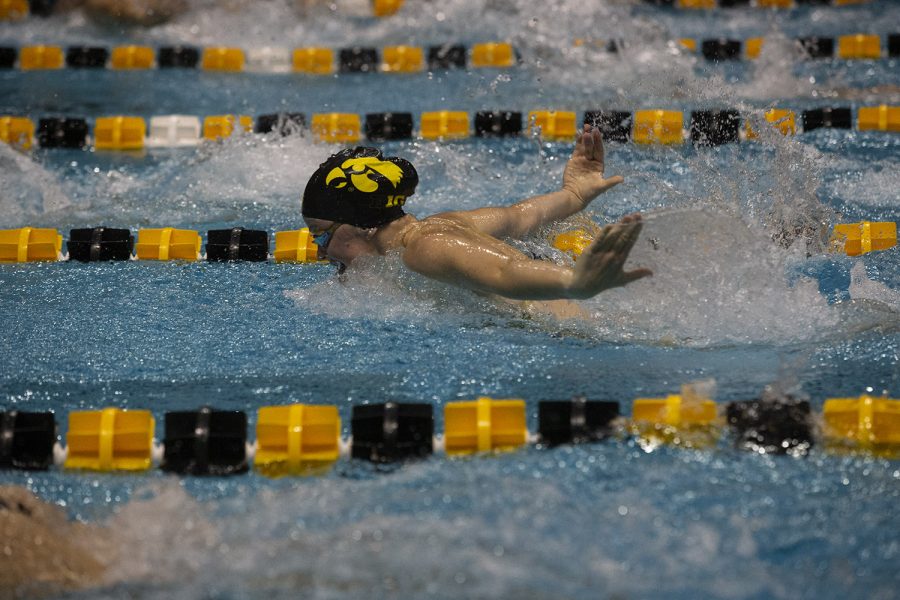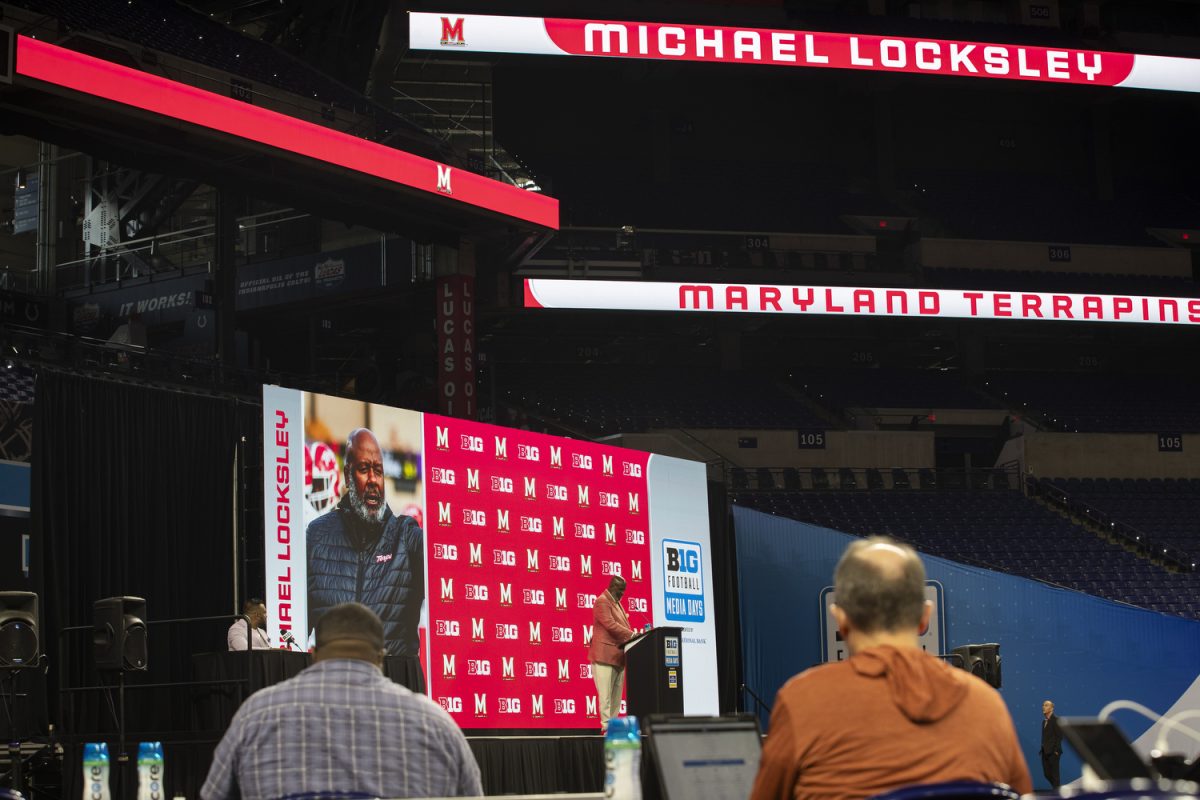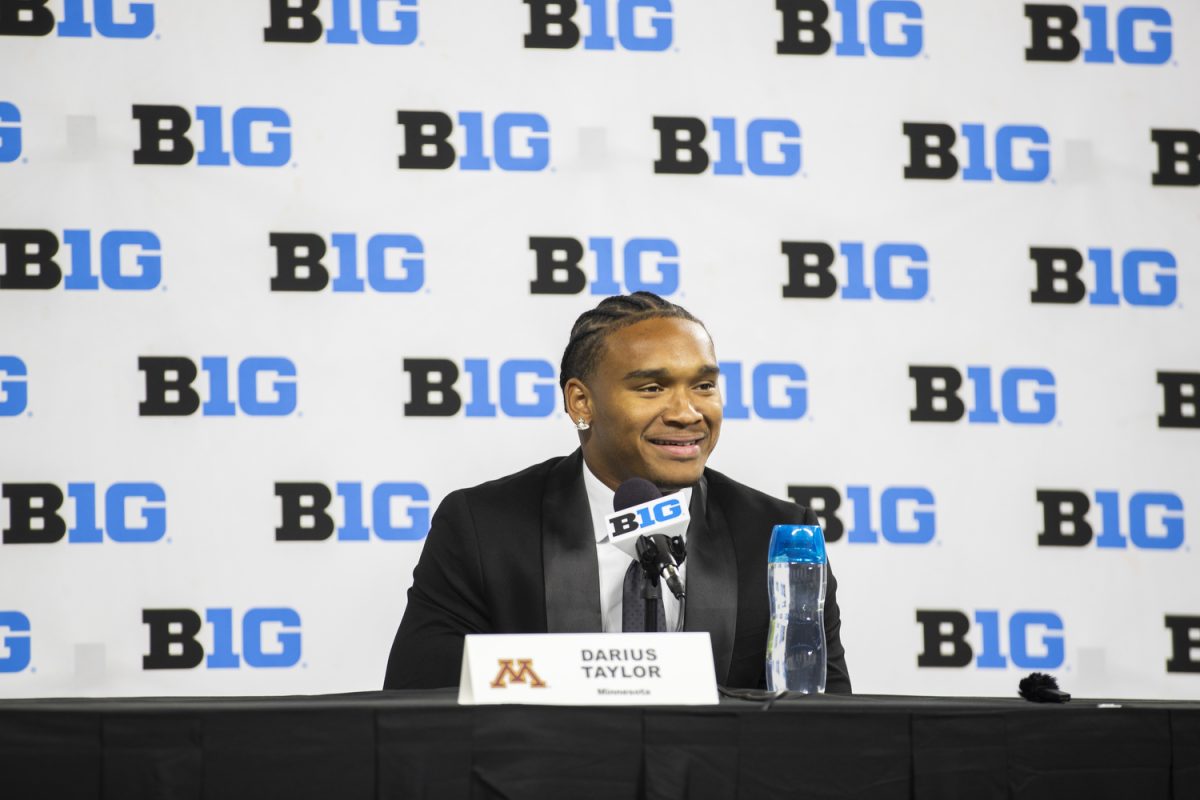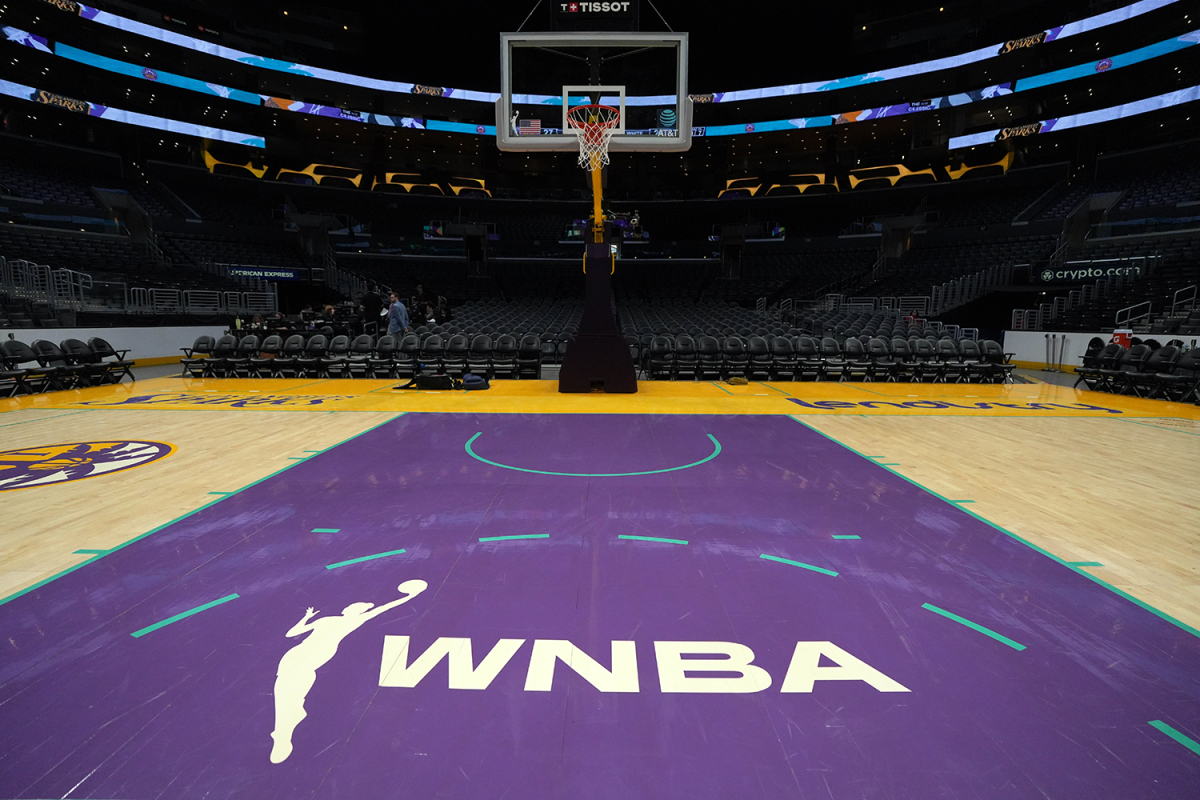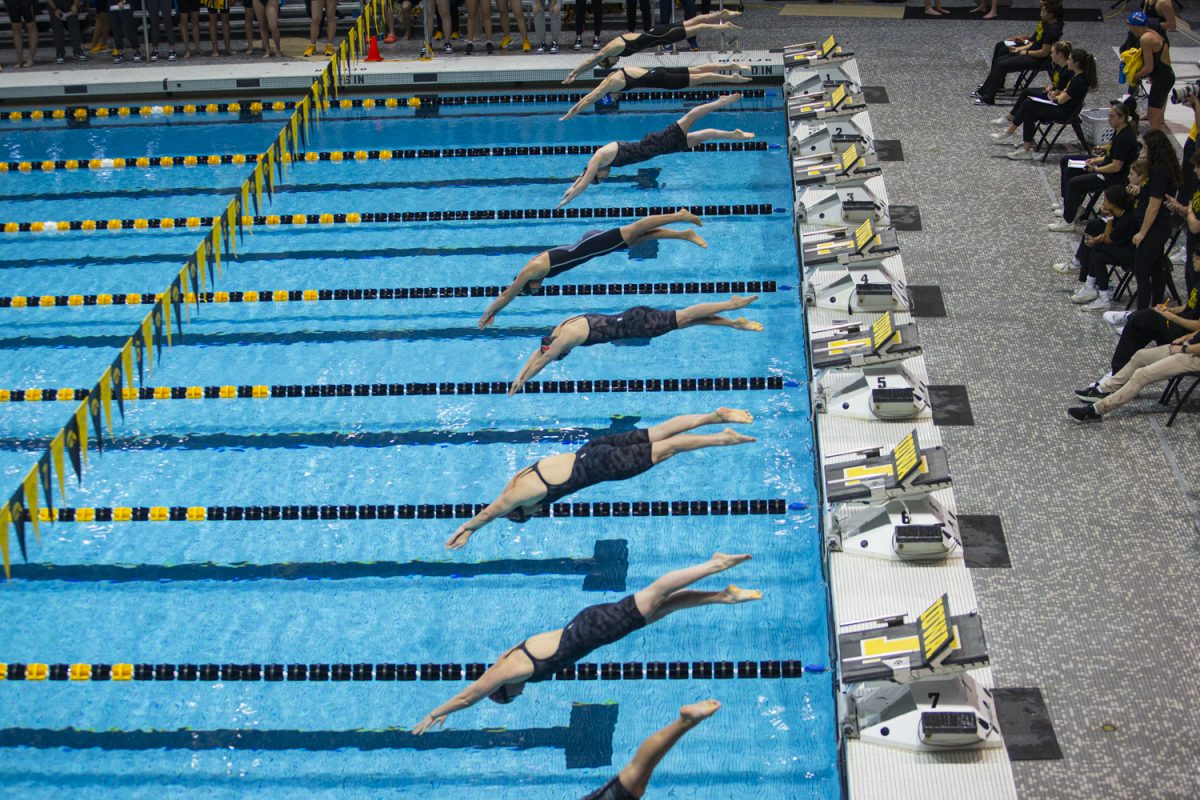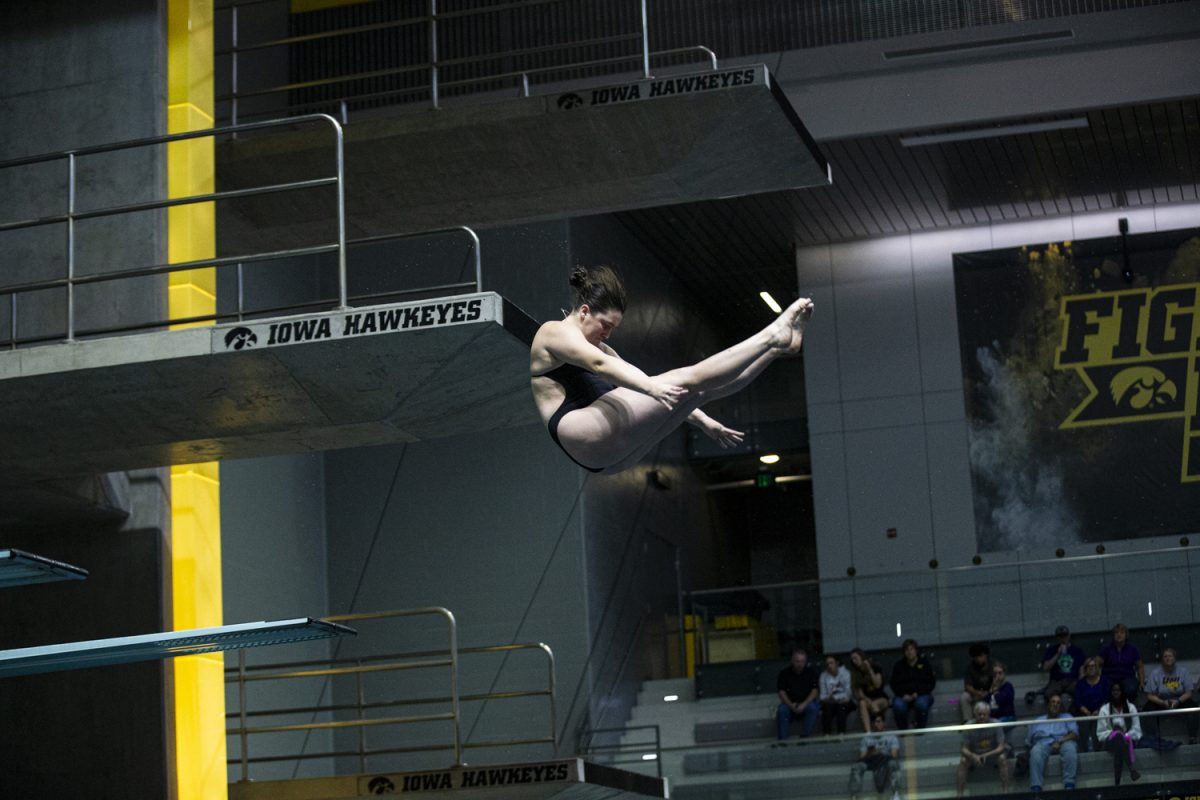Four years have passed since former University of Iowa athletics director Gary Barta announced that University of Iowa Athletics would cut four varsity sports. The Daily Iowan has spent the past several months tracking down the student-athletes whose NCAA careers were forced to move elsewhere or were stopped altogether. The following story is the third of a four-part series documenting the lives of some of these athletes since that point.
Former Iowa swimmer Christina Kaufman can’t help but wonder how her legacy will be remembered.
She thinks back to last year at the Tippie College of Business, where she was one of the school’s top student leaders, but she can’t forget her two seasons as a swimmer for the Hawkeyes.
When Kaufman walks past the pool at the University of Iowa Campus Recreation and Wellness Center, Kaufman finds tangible evidence that her actions will last long past her graduation.
Back in September 2020, Kaufman, alongside teammates Sage Ohlensehlen, Kelsey Drake, and Alexa Puccini, were four of six plaintiffs who sued the University of Iowa, accusing it of violating Title IX — a 1972 federal law prohibiting discrimination on the basis of sex in public education — when it cut the women’s team that August.
“[The Iowa women’s team] is swimming because of what I did, and they don’t even know that,” she said. “But it makes me feel good that I did do that. And now there’s girls having a blast on this team, there’s a coach who has a job … that wouldn’t be there if it wasn’t for what I did.”
Kaufman, 23, is an Iowa graduate student in finance who earned recognition from the Tippie College of Business as one of its top student leaders last year.
This legal action was the spark plug for eventual reinstatement that February, but for Kaufman, the decision wasn’t enough for her to continue the sport, but for teammate Anna Pfeiffer, the opportunity offered a much-needed homecoming.
The revival of the program was far from simple, and the aftermath wasn’t perfect. Nevertheless, nearly 50 years after its creation, Title IX wouldn’t go unnoticed in the place where it was first implemented.
Dedication amid depletion
Graduating from Hinsdale Central High School in Illinois, Kaufman was initially hesitant about going to Iowa. The school was both her parents’ alma mater, but she wanted to chart her own path. Both her parents were alumni, but she wanted to chart her own path. Kaufman had interest from Vanderbilt, but Iowa had a men’s team, which the Commodores lacked.
“It wasn’t a separated practice, it was the boys and I in the same lane,” she said. “They really pushed you when you’re training, it makes the environment more fun. Boys are goofier.”
Wanting to compete in this atmosphere, Kaufman accepted a walk-on offer from the Hawkeyes with the goal of making it on the traveling roster. By wintertime, Kaufman was not only competing on road meets but swimming collegiate-best times in the Big Ten Championships that February. Her career was only starting, and it appeared on track for success.
The same could be said for Pfeiffer, who joined the team the following season following an impressive career at Dubuque High School, where she earned four all-state nods. After Barta made the fateful announcement on Aug. 21, 2021, both thought they wouldn’t compete again.
As a walk-on, Kaufman never gave much credence to transferring, and for Pfeiffer, the financial burden of having to transfer schools proved too much. But the pair weren’t lacking any motivation.
“Honestly, I don’t think anyone after being cut wanted to wear the Hawkeye logo,” Kaufman said. “But we were doing it for our coaches and for each other. Competing was more than competing for Iowa.”
Pfeiffer recounted how after Iowa athletic department officials departed the room that day, then-head coach Marc Long delivered a speech. Mixing a few curse words, Long emphasized that no matter what choice an athlete made that season, it would be 100 percent backed by the coaching staff.
Two months into the 2020-21 season, Pfeiffer’s future plans shifted. After swimming a personal-best time in the 200-meter backstroke in an intrasquad meet right before fall break, she realized that her love of competitive swimming didn’t have a price tag.
“I was like, why am I deciding I don’t want to do this anymore?” she said. “So then I decided to reopen my mind and reach back out to schools that I had called … I love the sport too much just to stop, I know I can do more.”
Meanwhile, Kaufman found herself inside a lawyer’s office that September, listening intently as an attorney explained how she and her teammates’ Iowa careers could be saved. An email was sent out to the entire roster asking if they would like to sign the legal document, and Kaufman was encouraged by her parents to put pen to paper. Even though she was competing as a public adversary to the athletic department and received more press attention, Kaufman never felt abandoned by her team.
“[Long] had always stood by us, really admired what we were doing, and was rooting for us,” she said.
With coordinating assistance from then-Hawkeye assistant coach Brian Schrader, Pfeiffer transferred to Missouri State in January and would arrive on campus the following season. That choice soon became more complex in the ensuing months. In December of that year, federal judge Stephanie Rose found the swimmers would have a “fair chance” of winning the lawsuit, and two months later, the university officially reinstated the program.
Barta delivered the news to the women’s team by stopping by the pool and pulling the women’s squad into the team meeting room before practice. Pfeiffer remembered the contrast of the scene — the eerie silence of the room juxtaposed by the boisterous hollering of the men’s team training outside. Both teams were preparing for the Big Ten Championships later that month, and for Pfeiffer, the news was met with mixed emotions.
“We didn’t end up getting in the water that practice,” she said. “[I was] definitely happy, definitely sad, confused, because I had already committed to a school. Definitely angry at the timing because we’re trying to prepare for a championship.”
The Hawkeyes placed eighth in swimming when the conference championships concluded on Feb. 27, 2021, but Pfeiffer also remembers having to watch Michigan State endure its final Big Ten competition. The Spartans’ men’s and women’s swimming and diving teams were cut in October 2020 and had not been successful with their reinstatement efforts.
“It was like, ‘Oh, a week ago we were in your spot, but now we’re not,’” she said. “It almost felt guilty going to Big Tens and see them, knowing they were still fighting.”
After wrapping up the season at the NCAA Championships in North Carolina, the Hawkeyes would face an uphill battle entering the 2021-22 campaign. Long and the rest of the coaching staff had departed. The head coach was offered the job but declined, citing a commitment to be with his family. The roster was sliced in half, with only 12 athletes on the roster that fall.
Without the coaching staff that recruited her and most of the teammates she had come to know in her career, Kaufman didn’t feel the same desire she once felt. Her actions helped save the program from extinction, but Kaufman decided not to be a part of its future. But she wasn’t alone — Puccini transferred to Arizona while Ohlensehlen and Drake graduated.
“I knew it would be weird going back to a different coach, not having a lot of my close friends, not having the guys,” she said. “It would just be weird.”
Over 350 miles away in Springfield, Missouri, Pfeiffer also felt somewhat out of place. She said her new teammates and coaching staff were more than welcoming of her, but she couldn’t push Iowa out of the review mirror. Whether it be a text from a Hawkeye teammate or a social media video of students rushing the field at Kinnick Stadium when Iowa football topped Penn State, her old stomping grounds kept calling.
“[My Iowa teammates] were like, ‘We still love it here, we miss you. We wish you were here,’” she said. “So that was always ringing in the back of my mind, I’m a small-town girl.”
That December, Iowa’s roster grew to 13, as Pfeiffer transferred back to Iowa City. Yet while Pfeiffer was thrilled to be back in familiar company, her satisfaction wasn’t complete. Without a full roster, winning a meet was practically impossible, as in some events, the Hawkeyes didn’t field an athlete. At the same time, the absence of their male counterparts was also glaring, but not overpowering.
“I obviously miss the men’s team … but being around the girls, they don’t give me a reason to miss them when we’re at practice,” she said. “They’re making the best of what we’re doing in rebuilding the program.”
Indeed, under new head coach Nathan Mundt and his philosophy of controlling attitude and effort, the Hawkeyes have catapulted themselves to newfound success. Their five wins this season were more than the team had in their last two seasons combined.
Yet at the same time, the team makes sure to uphold tradition. After every home meet, the team gathers in the diving well to sing the school fight song, not just treading water but thrashing arms to make the biggest splashes possible — no goggles allowed.
“I will take it to my grave that if they ever stopped this, I would be so furious with them,” Pfeiffer said with a smile. “It’s like a giant wave pool out there.”
As new waves of first-years entered the program, the memory of the team’s initial discontinuation faded. Pfeiffer said she’s shockingly met some teammates who were unaware that the squad had been eliminated in the first place. Pfeiffer, alongside teammates Sarah Ballard and Kennedy Gilbertson, were the only ones on last season’s roster who experienced the shift from cutting to continuation.
“In a way, we don’t want to tell them the whole story,” Pfeiffer said. “All the emotions and everything. Obviously, they know we’re rebuilding … but as a team, we have to move on in order to be successful.”
However, while the swimming team prefers to keep its focus on the present, it can’t ignore that its situation and surroundings were in large part shaped by Title IX, a policy whose impact has been felt in Iowa City long before the women’s swimming lawsuit.
Iowa’s recent history of Title IX
One year after then-President Richard Nixon signed Title IX into law, Christine Grant became Iowa’s first women’s athletics director — a position she held until her retirement in 2000. Before that job, Grant served as the president of the Association for Intercollegiate Athletics for Women, testifying before Congress during Title IX’s legislation process that the law must also apply to athletics. In addition, Grant was a consultant on the 1978 Civil Rights Title IX Task Force. After Grant’s departure, Iowa Athletics integrated into one department, which Barta was hired to lead in 2006.
In the lawsuit, titled *Ohlensehlen v. Iowa*, Barta and the Iowa athletic department were accused of not being in compliance with Title IX even before cutting the women’s swimming and diving program, as the university was not in compliance with Title IX’s first prong — that the number of female and male student-athlete opportunities must be proportional to their respective makeup of the university population.
The other two prongs of Title IX include a continual historical practice of expanding athletic opportunities for female athletes and accommodating the interests of female athletes. A school only needs to follow one of these prongs. Iowa Senior Associate Director Lyla Clerry said the university has historically and continues to rely on the first prong for its compliance.
To calculate this proportionality, one must compare the percentage of one sex within a university’s undergraduate population with that sex’s percentage of athletes. Title IX requires counting any female athlete — not a male practice player — on the roster, regardless of whether they joined the team past the first day of competition or were withheld from playing due to injury or academics.
Even though there is no definitive Title IX policy of how close the proportions must be, the U.S. Department of Education’s Office for Civil Rights defines satisfactory proportionality as “when the number of opportunities that would be required to achieve proportionality would not be sufficient to sustain a viable team.”
The university settled the lawsuit in October 2021, paying nearly $400,000 in damages, continuing the women’s program for at least seven years, and adding a women’s wrestling team, whose first season of intercollegiate competition in 2023-24 resulted in a national title. In addition, Tulane University sports law professor Gabriel Feldman monitored Iowa’s Title IX compliance in an annual Gender Equity Monitoring Report. His findings would span from the 2021-22 to the 2023-24 academic years.
Feldman’s report from 2021-22 found that Iowa women faced a 3.4 percent disparity in athletic participation, making up more than 52.4 percent of the athlete population but 55.9 percent of the undergraduate population. This athlete data was collected from the official rosters and tracked personnel changes in terms of cuts and transfers.
In spite of the disparity, Feldman noted female participation would “substantially increase” the following year with the addition of a women’s wrestling roster and a roster increase to the women’s swimming and diving team, so the UI would be in compliance with the first prong.
In Feldman’s most recent report, released on Oct. 1, 2023, he tallied that Iowa women made up 54.6 percent of athletes, but 56.2 percent of the university’s population; a disparity of 1.6 percent, which he said would be in compliance with the first prong.
He explained that Iowa would most likely reduce this gap with anticipated increases to women’s wrestling and swimming and diving rosters in 2023-24. Based on online rosters at Hawkeye Athletics, these rosters have increased by 10 and three, respectively. Feldman’s third and final report will be released to the public on Oct. 1, 2024.
Future of reinstatement for men’s sports
Even after Iowa athletics announced women’s swimming and diving was reinstated in February 2021, Barta and the department made it clear that men’s swimming and diving, tennis, and gymnastics were not going to be revived.
At the time, the Big Ten had reversed its decision to cancel the season, and instead would play a nine-game conference-only schedule that spring with no fans in attendance. Barta said this choice would lower Iowa’s projected deficit from $75 million to $40-60 million. Yet this mitigation didn’t provide enough financial security for the school to bring back the trio of teams, according to the release that February day.
“The financial challenge remains significant and the decision to discontinue the three men’s sports identified will remain in place,” the release read.
Iowa still made $32.5 million from media rights distribution for football in fiscal year 2021, but this revenue was overshadowed by the $71 million decline in revenue from the previous year, according to an athletic department financial report analysis from The Des Moines Register. All told, Iowa athletics earned about $74.8 million in revenue – creating a deficit of about $41 million.
However, in each of the last two fiscal years, Iowa Athletics has not reported a deficit. In fact, according to reporting from The Athletic, the department garnered about $7 million over expenses during fiscal year 2023 – the first time it received a seven-figure surplus in the last five years. Yet some of the department’s $167.4 million in revenue that year will be used as expenses in 2024.
In an email to The Daily Iowan, Iowa athletics chief financial officer Greg Davies said $14.3 million were received for specific facility projects.
Back in September, the Iowa Board of Regents approved renovations to a new football locker room, as well as a new facility for the spirit squad and women’s gymnastics. These would be funded by the athletic department and were projected to cost $22.5 million.
In addition, the athletic department is still paying back the $50 million loan it borrowed back in 2021. The department has 15 years to pay the loan back. Davies said the department paid $1.5 million of that loan in 2023.
In their final year of existence, Hawkeye men’s tennis, gymnastics, and tennis cost a little over $2.5 million to fund. Iowa still has collegiate tennis and swimming facilities at the Hawkeye Tennis and Recreation Center and Campus Recreation and Wellness Center, respectively.
When asked if it would be possible to speculate how much the three sports would cost to reinstate, Davies said, “Given the potential forthcoming changes in the collegiate athletics industry, it would not be prudent to consider adding additional sports in the current environment.”
In a statement to The Daily Iowan, new Iowa athletics director Beth Goetz, a former soccer player at Clemson and college coach, offered sympathy, but ultimately echoed Davies’ words.
“I can only imagine how devastating it would be to have your program eliminated and know that it has to be one of the most difficult decisions an institution makes. I’m sure it continues to be painful for those impacted here at Iowa due to their passion for their sport and this university,” she said.
“While we wish circumstances were different, given the unknowns in the landscape surrounding intercollegiate athletics and the fact we still have a significant financial commitment due to the pandemic, adding sports isn’t being considered at this time.”





